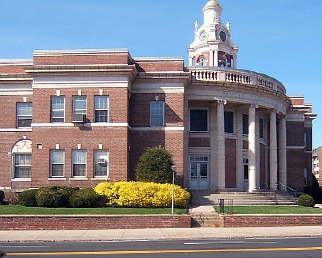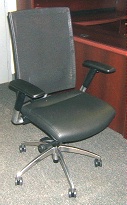 |
|
September 25, 2006
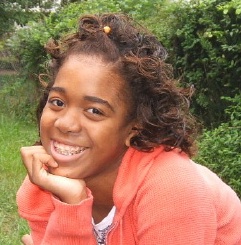
Photo/Sharon Bass
Nikia Mewborn, 13, student, dancer and quite endearing
By Sharon Bass
Two of Nikia Mewborn’s friends were shot to death in New Haven over the summer. Before that she lost a number of important family members, like her grandmothers.
The eighth-grader, who schools out of district, said she gets a lot of support from her parents and her church, Emanuel Baptist in New Haven. There she takes dance lessons, has modeled and finds solace and wisdom among friends of all ages, as Nikia navigates life in the early 21st century.
Hamden Daily News: What’s it been like since your dad was elected to the Legislative Council last November?
Nikia Mewborn: He always gets home very late and I don't get to see him that often anymore. But for me it’s kind of easy because I don’t have to do anything.
HDN: I see.
NM: I’m happy for him, I mean. But I don’t spend quality time with him anymore.
HDN: What did you and your dad do together before he was elected?
NM: Eat all day. [giggles] It’s mainly me and him eating all day and sleeping.
HDN: Did you do the cooking?
NM: Microwave. I cook on the stove sometimes.
HDN: Can you and your mom hang out and eat now that your father is busy?
NM: Yeah. We do.
HDN: But it’s not the same, huh?
NM: No. Not exactly.
HDN: Do you have aspirations to be a politician?
NM: No ’cause I just see the way my father does … I see that it’s not easy for him because you have to vote at the Council meetings. He’s just tired all the time and he really can’t talk.
HDN: What excites you, Nikia?
NM: Being a kid. Being normal.
HDN: That’s cool. What do you appreciate about being a child?
NM: Well, I think it’s not really being appreciative but a quote I go by is, ‘Live life the best that you can because we’re gonna grow up.’
HDN: You said church is a big part of your life. What does it do for you?
NM: It makes me happy to know that I have more family besides my blood family. It protects you. But frankly nowadays [kids] don’t realize that. That’s why a lot of people in New Haven are getting shot right now or they are violent. I’ve been trying to go to some of the funerals because I know some of the people that got shot, like the boy and girl.
HDN: Do you mean Justus Suggs and Jajuana Cole, the New Haven 13-year-olds who were shot over the summer?
NM: Yeah. I knew both of them. The girl was kind of like my sister because I grew up with her. And the little boy, I knew him.
HDN: I am so sorry.
NM: She was like my little sister. It kind of like took half of my heart away because half of my family already died. Jajuana would always be on the street, always be with the wrong crowd of people.
HDN: Were you worried about her?
NM: Yeah. She lived on a bad street anyway. I was upset with all the young people ’cause like they’re not even doing anything about this. And the parents are trying to stop it now with the curfew.
HDN: What should kids be doing that they’re not?
NM: Some kids, they don’t go to school. They don’t get their education. Some kids are out there doing the wrong thing, like shooting, getting guns, getting drugs.
HDN: Why do you think they do those things?
NM: Just for fun. They think they’re cool. They follow the wrong people. But it’s not good at all.
HDN: You said half your family has died.
NM: My grandmother on both sides, my nephew on my father’s side, a lot of godparents, some of my father’s best friends. When I was a little kid, like I really didn’t know anything about death. But now that I’m older I’m kind of afraid of death because I really don’t want to die. I want to try to stay in the world as long as I could. But I’m just saying all my family died, it was too much stress on one person. Four or five years ago, I lost my grandmother. I didn’t think that was going to happen, not knowing that she was sick. Nobody knew she was sick until it happened. That was just like taking everything away from me. And then when I lost my grandfather ... There really wasn’t that much stress on me because he wasn’t really a good guy. He really didn’t do the right thing either. He didn’t treat any of his grandchildren right. He didn’t treat my grandmother right. He smoked. He drank. That was another story. My grandmothers were like my best friends.
HDN: How has the stress affected you?
NM: I missed so much school. I started getting bad on my grades. Every time somebody died in my family, I would blame it on me.
HDN: You blame yourself?
NM: Yeah. When my mother’s mother died, I was like it was all my fault because nobody would ever take care of her. It was only me and my cousin helping her out. I just kept blaming myself. Now all of this stuff is coming back to me.
HDN: Do you blame yourself for your friends who were shot?
NM: No, not exactly.
HDN: What do you mean not exactly?
NM: Before she got shot, I hadn’t talked to Jajuana for a really long time. But then when I found out [she was killed], I was like I hadn’t talked to her in a long time, what was going on with her. I felt guilty that I would never call them [Justus and Jajuana] up that much to see how they were doing. I mean, it would have to be a long conversation to just check up on them.
HDN: Do you feel you could have saved their lives had you talked more often with them?
NM: Kind of something like that, ’cause I could have helped them and tried to tell them don’t be out on the street late at night ’cause there are some crazy people out there doing crazy things. But I don’t know.
HDN: I understand feeling guilty, but do you understand you had absolutely nothing to do with their deaths or your relatives’ and could not have prevented them one bit?
NM: Yeah. Well, my father’s friend died the day before my birthday [Sept. 2 of this year]. We knew about it because he was in hospice and he got really sick. The day of my birthday my uncle came in and [told the family] he died. So it was like quiet the whole day. I just knew my birthday wasn’t going to turn out good.
HDN: You have dealt with a lot of loss in your 13 years. How has it changed the way you think?
NM: Well, it just keeps motivating me and telling me not to go out on the street. Don’t hang with the wrong people. Do the right thing. Listen to your parents, even though I don’t do that every often.
HDN: Well, you are 13.
NM: [giggles]
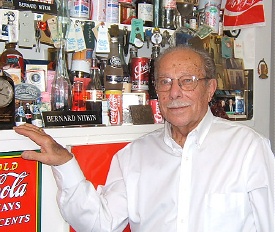
Photo/Sharon Bass
Bernie Nitkin, 86, accountant, Hamden Democratic Town Committee treasurer, Board of Assessment Appeals chair, former two-term councilman, QU class of ’49, devoted party man and wiseacre
By Sharon Bass
“Everything’s for sale,” Bernie Nitkin says of the chachkas in his 16-foot-by-16-foot Dixwell Avenue accounting office, or better yet novelty shop. His chachkas take up almost every inch of his workspace and are as amusing as the man himself.
The oldest thing in his office? “Myself,” says the father of five, grandpa of nine and great grandpa of three, who moved from his native New Haven to Hamden in the mid-20th century. Asked about his lifelong devotion to the Democratic Party, he says, “I’d even vote for a Democratic corpse.”
He gives the HDN a key chain with a $1 token from Mohegan Sun. “Do you gamble, Bernie?”
“I got married, didn’t I?”
Then he's asked about Hamden politics and the jokes stop.
Hamden Daily News: When did you get involved?
Bernie Nitkin: This is probably my 51st or 52nd year that I’ve been in politics -- consecutively.
HDN: Never missed a year. How long have you been keeping the books for the DTC?
BN: The day after Washington crossed the Delaware.
HDN: You’ve put in some years there.
BN: I’ve seen quite a few town chairmen. There were working town chairmen and there were town chairmen who were just town chairmen. I believe our present town Chairman McDonagh is doing a fantastic job because he’s right in there with all the people on the town committee. They know what’s going on. He’s been a very good fundraiser.
HDN: What else?
BN: I used to be on the Town Council when we had a first selectman form of government. At the time John DeNicola Sr. came into office. He was one of the best selectmen plus mayor that I’ve ever seen.
HDN: What did you like about him?
BN: Very honest. Very sincere and businesslike. He was the first mayor the town ever had because they changed the charter in his last year as first selectman.
HDN: Do you feel all the mayors in town have been honest?
BN: No. Some mayors are interested in who they appoint. They watch their budgets. Other mayors are just mayors. In name only. Ego. For example, you have a mayor now, a Democratic mayor, who handles every problem as though it was crucial. If you have a problem with a stop sign, he is willing to sit and give you time. While a lot of mayors are too busy to deal with the public’s problems. Our present mayor is excellent when it comes to that. He pushes aside his business and comes back to the taxpayers and is sitting in front of them with a problem.
HDN: Hamden politics in the ’50s and ’60s. Tell me about it.
BN: At that time the Republicans and Democrats both worked for great government and the taxpayers. There wasn’t much animosity between both parties.
HDN: Why the change?
BN: I have no idea. Could be the way things are going up in Washington, where you now have Democrats and Republicans fighting one another and no longer interested in what is good for the taxpayer. They’re interested in what’s good for the party.
HDN: Are you aware of the failed effort to phase in the new property valuations?
BN: I heard about it. Phasing it in isn’t going to do any more than biting the bullet because it’s still going to cost you the same down the line. I feel it was too late to make the change.
HDN: You know money. How bad is Hamden’s fiscal health?
BN: I think the financial situation is bad in every town. We need help now due to the fact that you’ve got houses on the street selling for $350 or $400,000 or $450,000. And they [homeowners] get very, very aggravated when they get their new assessment and their assessment has gone way up. It’s being created by the market itself. Seniors now are being out-taxed.
HDN: So what’s the answer? Or an answer?
BN: If I knew what the answer was I would be mayor. I don’t know what the answer is. Because if you’re gonna get help from your state, your state income taxes are going to go up. Because the state gets its money from your state income tax, etc. It’s the same as a husband saying to the wife, ‘You’re spending $80 a week on food. You gotta cut down.’ But if you’re going to buy food for 60 or 50 you’re not going to get the same food, or as much. The same way with taxes. Now you say to yourself, do you want to cut services. And you’ve got the people who are interested in education. Do you want to cut the education budget? Can you cut police? Can you cut fire?
HDN: Do you see any fat in either the town or school budget?
BN: Well, it could be the [school] administration, too many assistant superintendents. Now you’ve got to go through securities in the schools. It’s a cost. You’ve got them now going out and buying equipment to make sure when a kid comes in he hasn’t gotten anything metallic.
HDN: What a departure from years ago, huh?
BN: Security is mandatory. Wherever you go now. The airports. At football games. Everybody wants to be protected. And to get the protection you’ve got to pay for it. And that’s another thing that’s encumbering the taxpayer.
HDN: Do you think some of it is driven by political scare tactics?
BN: I don’t know. But politics today are a big disappointment compared to what we had. The Council made up of Democrats and Republicans -- and during even Republican majorities -- when the meeting was over, both sides went to Reilly’s. It was a friendly atmosphere.
HDN: When did you notice the change?
BN: After [Democratic Mayor] Dick Harris [elected in 1979].
HDN: What happened?
BN: After Dick Harris I don’t believe politics was ever the same.
HDN: What happened?
BN: I have no idea.
HDN: But what did you see shift?
BN: In other words, everything became who was in politics and who’s pushing through their agenda. After the mayor was elected he was running for office, again. The day after he was elected he was running for office again.
HDN: And the Legislative Council?
BN: Up to a certain point, the Council used to side with the mayor. Now you’ve got diversity within your own party on the Council.
HDN: Is that good or bad?
BN: Obviously it’s bad.
HDN: Why?
BN: Because when you’ve got a mayor that’s Democrat that’s been elected or a Republican that’s been elected on a certain, specific agenda, he’s having a big difficulty trying to get his agenda through when his own council is diversified.
HDN: But aren’t people elected to a town council to be a check and balance for the mayor and to do what they feel is best for the people?
BN: They are. Yes. They are a check and balance. But they are more a check and balance, I feel, among themselves than the mayor himself. To be more specific, all I can say is that three-quarters of the members of the Council have their own agendas and that’s what they’re trying to push through.
HDN: Any regrets, Bernie?
BN: None so ever. No. I’ve enjoyed Hamden and I believe Hamden has enjoyed me. I’ve got a lot of friends on both sides and very few enemies.
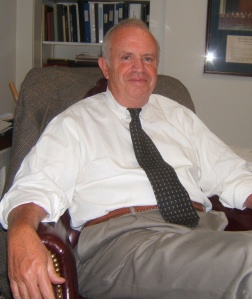
Photo/Sharon Bass
Larry DeNardis, 68, president emeritus UNH, former Republican congressman and state senator, Hamden High class of ’56
By Sharon Bass
DeNardis, who lives on Still Hill Road, has an impressive background. Before serving his one term in Congress in the early '80s, he represented Hamden in the state Senate from 1971-1979. From 1985-1987, he was acting assistant secretary for legislation in the Department of Health and Human Services. President Ronald Reagan appointed him. Four years later, DeNardis landed the top job at the University of New Haven. He retired in 2004 and is now president emeritus.
Over the last two years, he said he’s visited 12 countries often on assignment for the State Department or USAID. In July, he was the State Department’s senior education advisor for the G-8 Summit in St. Petersburg, Russia.
DeNardis said he would not be daunted by a mayoral run in Democratic-laden Hamden. After all, he beat now U.S. Sen. Joe Lieberman for Congress in 1980. They’re still friends.
Hamden Daily News: Any plans to run for mayor next year?
Larry DeNardis: No.
HDN: Were you approached?
LD: Oh, sure.
HDN: Twenty-six years ago, you won the third congressional district, a Democratic stronghold.
LD: The seat I had won had been held for 22 years prior to that by [Democrat] Bob Giaimo, who recently passed away. I’m the only Republican to have held that seat since 1958. So, Bob Giaimo indicated rather late in the election cycle March of 1980 that he wasn’t going to run again. So both parties scrambled for candidates, or that is candidates in both parties scrambled for the nominations. I sought the Republican nomination and Joe Lieberman sought the Democratic nomination for the 97th Congress.
HDN: By how many votes do you beat Lieberman?
LD: Oh, I think it was in the neighborhood of 5,247. It was a surprise because it was and continues to be a strong Democratic district.
HDN: How well did you know the current Connecticut for Lieberman party Senate candidate?
LD: We had both been 10 years state senators. We got to know each other as new rookie state senators in 1971. We got to know each other extremely well.
HDN: So when you two ran against each other for Congress, you were pretty good friends?
LD: Yes. Good friends and professional friends. It was expected because the district was so strongly Democratic that he would win. Moreover, I had a primary fight which added a dimension of difficulty to what I was doing. [Lieberman was not primaried.] But in hindsight, the primary turned out to be beneficial for me because of name recognition and we had a monopoly of the news until the primary day in September, and it proved to be an advantage and not a disadvantage.
HDN: What was Lieberman like when you first got to know him?
LD: Oh, Joe has been basically the same kind of person you see now. The basic person hasn’t changed. You can bicker with his political views, but as a person he’s a consummate gentleman.
HDN: Do you think he’s grown more conservative over the years?
LD: When he was state senator from New Haven he was regarded as a liberal in the context of Hartford politics, largely because the people who represented the cities, Hartford, New Haven, Bridgeport and so on, were generally pursuing policy objectives that could be described as liberal. So he was regarded as an urban liberal. But I’m not sure that was fair. I think he was just simply representing New Haven.
HDN: No change then?
LD: No, I think he has always been a commonsense person. I think he’s adhered to a certain sense of principals about civic life and public policy. He is by nature someone who tries to solve problems. Sometimes he’s accused of compromising too quickly. But I think he has perfected the art of compromise. We reached across the aisle, he and I as state senators, often in the 1970s. In fact, we cosponsored a lot of legislation together.
HDN: Lieberman’s critics accuse him of acting like a Republican. Would you agree?
LD: No, I don’t think he’s acting like a Republican. He’s got a decidedly Democratic voting record. He votes with them 90 percent of the time. He cites it all the time, but so do Republicans.
HDN: But his voting record on pivotal issues, like the Iraq War and Cheney’s energy bill, is decidedly Republican.
LD: Now you’re showing your stripes. Well, shame on the Senate that there are only that number of instances when you can reach across the aisle and try to join hands to deal with the problem.
HDN: Do you think there’s big trouble in D.C.?
LD: Things are out of control in Washington. It’s highly politicized. The parties have moved away from problem solving and toward posturing most of the time. So if you like to talk and hear yourself talk, then Washington is the place for you.
HDN: You say the politicians are out of control. Bush, too?
LD: I basically support Bush’s defense policies. I think that I would approach some of these issues in Washington much the same way as Joe has. The same desire to see some things accomplished. To reach a level of agreement rather than to poison the well with these speeches, which are vituperative, some would say vicious.
HDN: Still in touch with Joe?
LD: Sure. I talked to him a few months ago.
Site designed by Joanne Kittredge

Tip Us Off
Send
news tips

